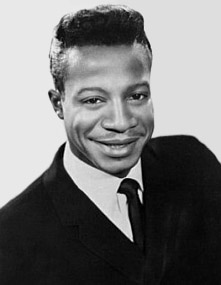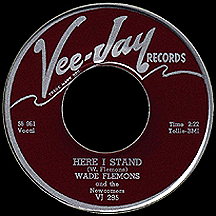WADE FLEMONS
AND THE NEWCOMERS
Here I Stand
The year was 1955 and another of America's thousands of vocal groups was being assembled with five hopeful young singers. The place was Battle Creek, Michigan, known more for breakfast cereal than the home of great musicians, not exactly a hub of competition such as New York or Philly, but that probably allowed the better acts to be more easily noticed. The Shifters were named as such because they considered themselves versatile, figuring each could take any role (lead, tenor, baritone or bass) at any time. Lou Wilson, James Kelly, Ed Horsley and Lewis Grave usually backed standout lead singer Wade Flemons. Born in Coffeyville, Kansas (just north of the Oklahoma border), Wade had spent his younger years singing in church about a hundred miles away in Wichita. He was unfamiliar with the big city street corner scene until his family moved to Michigan several years later.
The five high school pals spent two or three years practicing while attending Battle Creek Central High, then made a quick sprint to a studio in nearby Kalamazoo to record a song, "Here I Stand," that Wade had written. Copies were sent to various labels and Vivian Carter of Vee-Jay Records in Chicago was the only one who showed any interest. But one was enough. Vee-Jay had been in business since 1953, making a mark early with bluesman Jimmy Reed. Viv and James Bracken (partners in business and personal life) had moved the operation from Gary, Indiana to Chi Town within two years of inception.
When Flemons and the Shifters came along in the summer of 1958, the Brackens suggested a different group name, The Newcomers; "Here I Stand" ('...all alone in my lonely world, all alone-a-waiting for the girl...') has a nicely understated arrangement highlighted by the group's 'La-la-la's and Flemons' tortured-but-hopeful delivery of lyrics promising to 'love you so.' The single landed on the pop charts in November '58 and spent three months in the rhythm and blues top 30. The B side, "My Baby Likes to Rock" (also penned by Wade), is an infectious mid-tempo, sax-backed description of what it takes to get a certain "rockin' queen" to dance. Perhaps it should have been saved for the A side of the follow-up disc.
"Hold Me Close" (composed by Jimmy Williams and notable Elvis contributor Otis Blackwell) was arranged as a near-identical twin to "Here I Stand," the likely reason it was cold-shouldered. Summer '59 had rolled around by the time Blackwell's "Slow Motion" was issued and had some brief chart action. The Newcomers, though credited only on the first single, continued doing session work but were relegated to the background as the record company prioritized Wade, spotlighting him as a solo act. GM Ewart Abner even bragged about what a big star he was going to be. The group fell apart within the first two years. Eventually, Flemons would feel a similar sting in his own career.
He reached the charts again in February with one of his catchiest tunes, "What's Happening," a somewhat frustrating but upbeat take on romantic pursuit. A Jesse Stone composition became Flemons' biggest hit; "Easy Lovin'" has a classic sound with mildly suggestive lyrics and it's easy to imagine how someone like Wade's idol Nat "King" Cole could have connected with it. In May 1960 it reached the R&B top ten, Wade's only release to do so. The next two singles had a connection to other Vee-Jay acts; the Jimmy Reed song "Ain't That Lovin' You Baby" underwent a big band makeover and was followed by a pair of compositions by The Impressions' Curtis Mayfield, one bouncy and sweet ("At the Party"), the other dark and disparaging ("Devil in Your Soul"), both produced by and featuring guitar work by Curtis (much as he'd done with fellow Vee-Jay star Jerry Butler). Confoundingly, neither release had even minor success. Only one other single charted, making it to number 20 R&B in 1961: a remake of Percy Mayfield's hit from '50, "Please Send Me Someone to Love," its use of a string orchestra a far cry from the arrangement of the original.

Continuing to issue new material including country/pop ballads along the lines of Ray Charles' spectacular 1962 recordings and pop gems like Joe South's "I Knew You When" (a hit for Billy Joe Royal several months after Flemons' version failed), the main source of Wade's income from '61 to '63 came from touring, often as part of package shows with other stars of the day including Butler, Mayfield and more recent Vee-Jay signees The Dells and a white group that wound up being the label's greatest act yet, The 4 Seasons (they even backed his vocals on a late-'63 single, "Watch Over Her," written by Bob Gaudio and Frankie Valli). Several months prior, a new version of "Here I Stand" by Columbia act The Rip Chords had been a hit in many markets and as a result prompted Wade to focus more on his songwriting. He came up with a hit for Mary Wells, "Ain't it the Truth" (written with Barrett Strong and Dells bass vocalist Chuck Barksdale), shortly after she left Motown for 20th Century-Fox Records.
Memphis-born Maurice White had been working as a session drummer at Vee-Jay and Chicago rival Chess Records. With Don Whitehead and Maurice, Wade composed "Stay in My Corner" for the Dells, who racked up a minor hit with the song on Vee-Jay in '65. Right around that time, Wade began two years of service with the U.S. Army while remaining loyal to the record company he'd always been with...only prior to his discharge in '67, Vee-Jay went into bankruptcy and closed its doors. Two singles in 1968 ("Jeanette" and "Two of a Kind") were recorded for the Ramsel label under a new production company, Hummit, that he formed with White and Whitehead. Oddly, his vocal sound on these bore little resemblance to earlier efforts. That summer the Dells, who'd signed with Chess, remade "Stay in My Corner" as an extraordinary six-minute ballad and it became their biggest hit (and Wade's top seller as a songwriter).
In 1969 he formed a band with Maurice White and Don Whitehead, The Salty Peppers, and they put out "La, La, La," an instrumental jam (with 'la-la' vocals) on the TEC label. Then Capitol records picked up the track and reissued it as "La La Time." The trio left Chicago for Los Angeles in 1970, added Maurice's younger brother Verdine White to play bass, and changed the band's name to Earth, Wind and Fire. Before long the roster had swelled to as many as nine players and they made two albums for Warner Bros. Records, getting one single, "Love is Life," into the charts in July 1971. Wade's role was gradually downsized from lead singer to harmony vocalist, electric pianist and occasional vibes player. Just as his Newcomers had been phased out years earlier, so was he with EW&F; by the time the band signed with Columbia, on the verge of rolling out a string of major hits and amazingly diverse albums, Wade's affiliation had become a thing of the past.
One banished member of The Newcomers, as it turned out, hadn't given up. Lou Wilson reemerged in '71 with "This Love is Getting Deeper" by Lou Wilson and the Living Ends on the Supreme label and in '72 with "Talkin' 'Bout Poor Folks Thinkin' 'Bout My Folks" as Lou Edwards with the group Today's People on Columbia. He continued performing and recording soul and blues songs for many years. Wade Flemons, on the other hand, called it quits after leaving Earth, Wind and Fire, moved back east with his wife and led a comfortable, relatively quiet life until cancer took his life in 1993 at age 53 in the city he considered his home town, Battle Creek.


